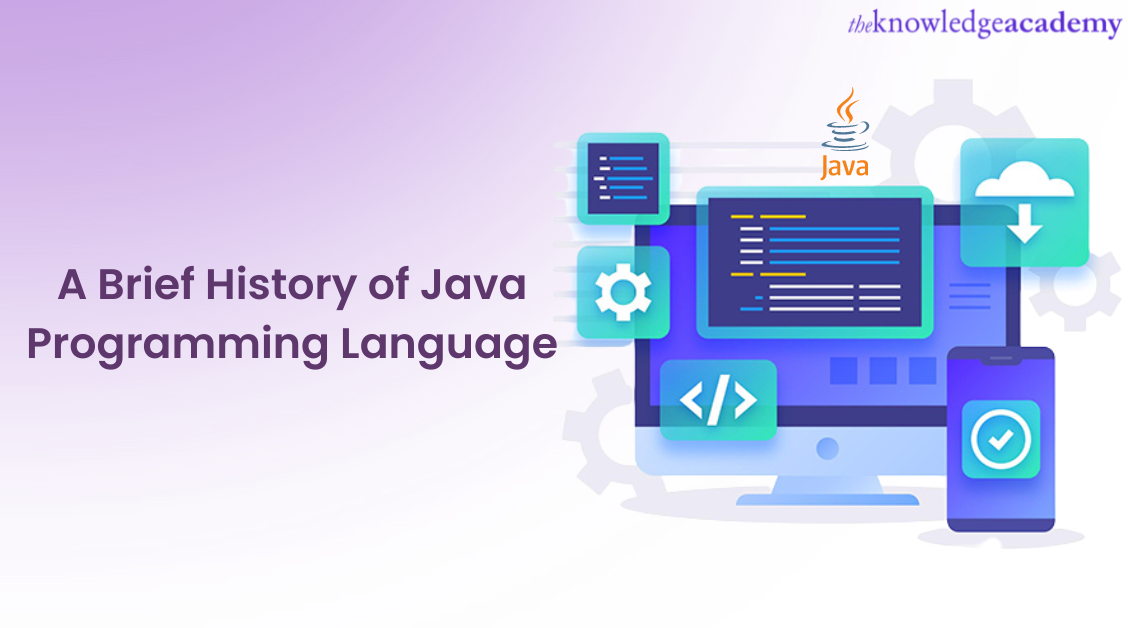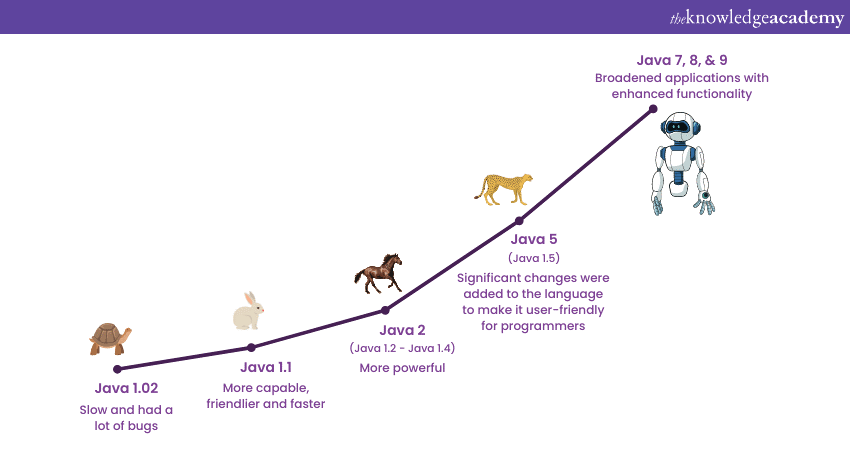We may not have the course you’re looking for. If you enquire or give us a call on 01344203999 and speak to our training experts, we may still be able to help with your training requirements.
Training Outcomes Within Your Budget!
We ensure quality, budget-alignment, and timely delivery by our expert instructors.

The history of Java is a fascinating story of collaboration, innovation, and the adoption of evolving technologies and trends. It is a widely used language that has significantly impacted the world of software development since its inception in the mid-1990s.
The language was developed by a team of programmers at Sun Microsystems, led by James Gosling, and was designed to be portable, secure, and platform-independent. The first version of Java, Java 1.0, quickly gained popularity among developers and businesses due to its features, like platform independency.
Oracle, which acquired Sun Microsystems in 2010, estimates that Java is being operated on more than 3 billion smartphones around the globe. Its wide success and popularity can be attributed to several factors, including portability, ease of use, and security. Additionally, Java has a large community of developers contributing to its ongoing development and improvements.
Whether you are a seasoned developer or you're just starting out, Java is definitely a language worth learning. In this blog, you will learn more about the history of the Java programming language, including how it changed over time with different Java versions.
Table of Contents
1) What is the history of Java?
a) The birth of Java
b) The naming of Java
c) The story of Java after 1995
2) Versions of Java
3) Importance of Java
4) Conclusion
What is the history of Java?
Java is a platform-independent and Object-oriented language that is extensively used worldwide. It was first released by Sun Microsystems in 1995. Since its origin, Java has become one of the most popular programming languages worldwide, powering everything from the web to mobile applications. Here is a detailed history of Java programming language:

The birth of Java
Java was developed by a team led by James Gosling and his colleague Mike Sheridan and Patrick Naughton in 1991. They created the language considering that it would be used in set-top boxes, which were popular at the time for accessing television services. It differed from the conventional languages, as it was intended to be compiled to bytecode and then run by a virtual machine, particularly Java Virtual Machine (JVM).
Java quickly became famous as it was simple, easy to use, and could run on any platform. They named this project “Greentalk”, and the file extension was called .gt. Java borrows much syntax from C and C++ as the main goal for Gosling was to create a language that had a similar character to C and C++ but more uniform and simpler than that.
Finally, James Gosling named the project “Oak” after the Oak tree planted outside the office of Sun Microsystems. Unfortunately, the project did not succeed commercially then as it was ahead of time, and the industry’s focus was profitability.
The naming of Java
James Gosling chose the name Java from suggestions like Silk, jolt, DNA, etc. At the end of all suggestions, he named the software – Java in 1995. This name was based on the name of an espresso bean he thought of while having coffee near his office.
The Story of Java after 1995
In 1995, Sun Microsystems released the first Java version, java 1.0. After that, it was incorporated into web browsers. This also made the Java team realise that the Internet would be the perfect network to promote their product.
After the success of Java 1.0, Sun Microsystems tried to make Java an official standard by asking ISO/IEC JTC1. But the Java team changed their mind sooner and did not finish the process. They made it a free platform that would be controlled through the community process. Sun Microsystem lets people use Java for free, as they make money from other things they sell.
One of the most popular uses of Java is in developing android apps that run on the android operating system. It is used in many enterprise applications and is valued for its security and scalability.

Versions of Java
Till now, many versions of Java have been released. The table given below shows the updates till March 2023.
|
Version |
Release date |
|
JDK 1.0 |
23rd January 1996 |
|
JDK 1.1 |
2nd February 1997 |
|
J2SE 1.2 |
4th December 1998 |
|
J2SE 1.3 |
8th May 2000 |
|
J2SE 1.4 |
13th February 2002 |
|
Java SE 5 |
29th September 2004 |
|
Java SE 6 |
11th December 2006 |
|
Java SE 7 |
28th July 2011 |
|
Java SE 8 (LTS) |
18th March 2014 |
|
Java SE 9 |
21st September 2017 |
|
Java SE 10 |
20th March 2018 |
|
Java SE 11 (LTS) |
25th September 2018 |
|
Java SE 12 |
19th March 2019 |
|
Java SE 13 |
17th September 2019 |
|
Java SE 14 |
17th March 2020 |
|
Java SE 15 |
16th September 2020 |
|
Java SE 16 |
16th March 2021 |
|
Java SE 17 (LTS) |
14th September 2021 |
|
Java SE 18 |
22nd March 2022 |
|
Java SE 19 |
20th September 2022 |
Learn how to develop web applications using Java programming with our Web Development Using Java Training course!
Importance of Java
Java is an important programming language that is used by millions of developers worldwide. It is popular because it is user-friendly, secure, and platform-independent. This means it can run on different devices and operating systems.
Java is used for developing a wide range of applications, from mobile applications and desktop software to web applications and enterprise systems. Additionally, Java has a vast library of open-source frameworks and tools that make programming more accessible and efficient. Its popularity and versatility make Java an essential skill for any programming aspirant.
Learn the essentials of Java and give a boost to your career; register for our Java Training now!
Conclusion
Java has come a long way since its origin in the mid-1990s. Due to its Object-oriented design and extensive library, it has enabled the development of countless applications and systems. As the history of Java continues to evolve, it remains a relevant and valuable tool for developers to date. Hence, its influence will continue to shape the future of programming for years to come.
Know how to make applications using Java with our Java Swing Development Training course today!







 Top Rated Course
Top Rated Course



 If you wish to make any changes to your course, please
If you wish to make any changes to your course, please


